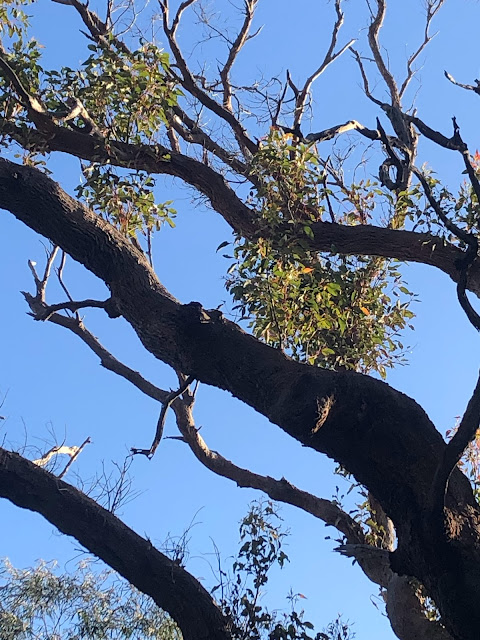In my defense, it was getting late, into the windswept and interesting hour. On the second day of the party, I slept in my tent and woke up hot and hungover. It was evening again and the birds were calling - a mirror to the dawn chorus we'd listened to, ecstatic and tired after the all nighter.
Someone had lit the fire in the drum and they were about to torch the bonfire. Sprat hosed down the surrounding wattles and then kinked the hose, in case of emergency. Sister dolloped diesel over the wood pile and lit a match.
Later, as the sacrificial sofa folded into itself on bonfire coals, partygoers straggled back to the main camp where we sat on chairs and surviving sofas around the fire drum. A DJ played under an Oztrail shelter and blue laser lights shimmered through the peppermint trees. Two young men came to sit beside me by the fire.
"I'll give that a three," said the man in a hat, pointing at a woman slouched in a saggy blue velour couch.
"Yeah, I reckon, a bit awful," said his friend. "But that one's better," he nodded to another woman sitting upright in a comfy looking camp chair. "Seven?"
I could feel my whole body tighten. I remembered when, as a twelve or thirteen year old on my first visit to Middleton Beach with mates instead of my parents, a row of men held up score cards for every girl or woman who walked past. They were probably only a few years older than me and a roar of laughter went up every time they held up the numbers. It was terrifying. "She's pretty," one would say. "Pretty fucken ugly," another said and held up the number three. More laughter.
So back to 2022 and a very different generation of young men, I turned to them, seething. "How old are you guys?" I asked.
"What do you mean?" The man in the hat said.
"Are you, like, fourteen or something? What makes you think you can behave in that way? In this era?"
"Um ... what?"
"Who the fuck do you think you are?" I must have looked angry. Apparently when I'm really angry my left eyelid twitches.
He stared at me, looking baffled. "What's your problem?" He got up and he and his friend walked away to join another subsect of the party.
An hour or so later, the man in the hat returned to sit by my side. By then I'd had a bit of time to think about the scenario. I'd begun to doubt not myself but my idea about what they'd been doing, based on looking at my own prejudices after that experience as a kid at Middleton Beach.
"Hey ... you know how I jumped on you a while back -"
"Yeah! What was that about?" He asked.
"Were you rating women? Because that's particularly gross you know."
He stared at me and then started laughing. "No man! Oh wow. If you'd just said that ... we were rating chairs. See that one?" He pointed to the blue sofa, now occupied by a man in an Always Was, Always Will Be hoodie. "It sags in the middle. It's fucking awful. We were rating chairs, Sarah. By the way," he pointed to the plastic primary school chair I was sitting on. "Yours is a five."
"This is a very attractive chair, thank you very much," I replied, squirming on my chair, feeling an apology coming on.




